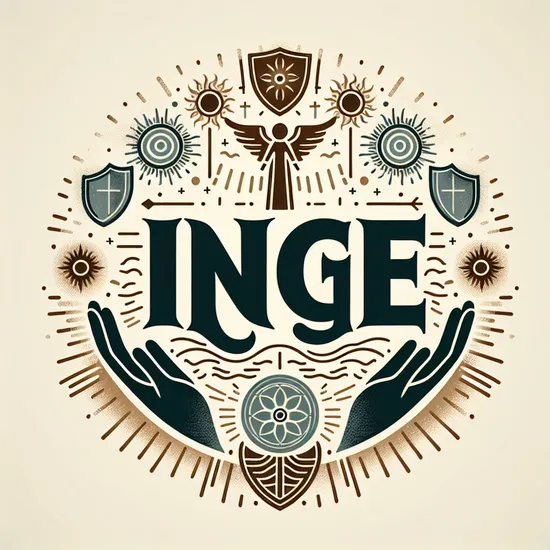Inge - Discover the Meaning, Origin, and Global Usage
Meaning Behind the Name Inge
The name Inge has a deep-rooted history with the meaning protection and guardianship. Derived from a rich tradition of names, it is associated with strength and a protective nature. The meaning guardian is emblematic of an innate ability to safeguard and cherish, making it a name of significance and reverence.
Find more names related to the name Inge.
Guardian,
Warrior,
Brave,
Norse,
Scandinavian,
Pronunciation of Inge in Nordic Languages
/ˈiŋə/ - Inge
- /ˈiŋ/: 'ing' as in 'sing'
- /ə/: 'a' as in 'sofa'
The name 'Inge' is pronounced as 'ING-uh'. It's similar to the word 'sing' followed by a gentle 'uh' sound, which makes it easily pronounceable for English speakers.
Tracing the Origins of Inge
The name Inge originates from the ancient beliefs of the Nordic people. As a name tied closely to the deity Ing, who was worshipped across the Scandinavian peninsula, it embodies a connection to northern Europe. Historically, it is deeply ingrained in cultural traditions and celebrated for its profound mythological links.
The Gender Identity of Inge
The name Inge is recognized as a gender-neutral name, making it equally popular among both males and females. In countries like Norway and Germany, it holds this versatile gender aspect. Examples include famous figures like Inge de Bruijn, a female Olympic swimmer, and Inge Lønning, a male Norwegian academic.
Popularity Over Time for Inge
Historically, the name Inge has seen various shifts in popularity. During the 20th century, it was quite popular across Scandinavia and Germany, particularly in the 1940s. Today, its usage has declined slightly but remains well-regarded, especially in regions where traditional names enjoy longevity.
Worldwide Usage and Perception of Inge
Inge is predominantly used in Scandinavia and Germany. Variations in pronunciation are observed across Denmark and Sweden. The name often aligns with cultural heritage, maintaining distinctive popularity within those areas and serving as both a first and middle name in other parts of Europe.
| Global Distribution and Gender Ratio of the Name Inge |
| Country |
Usage % |
Female % |
Male % |
| BE |
42.58% |
99.63% |
0.37% |
| ID |
22.2% |
100% |
0% |
| NL |
15.48% |
99.49% |
0.51% |
| NO |
2.92% |
5.41% |
94.59% |
| US |
2.84% |
97.22% |
2.78% |
Gender analysis and regional popularity insights are derived from sources such as Gender API.
Key Characteristics of Those Named Inge
- Protective: Strives to shield and safeguard close ones.
- Loyal: Renowned for steadfast loyalty and reliability.
- Resilient: Possesses exceptional strength to withstand challenges.
Career Paths Common for Inge
- Creative Arts: Often drawn to fields such as music, art, and literature.
- Leadership: Demonstrates capable leadership skills in management roles.
- Social Services: Inclined towards altruistic professions, promoting welfare and protection.
Fascinating Aspects of the Name Inge
- Historical Relevance: Featured in many old Norse sagas and legends.
- Pop Culture: Inge Solheim is a renowned polar explorer seen in various documentaries.
- Literary Presence: Often used in Scandinavian literature to symbolize protection and nobility.
Notable Figures Named Inge
- Inge de Bruijn: Dutch Olympic swimmer.
- Inge Lønning: Norwegian academic and politician.
- Inge Solheim: Norwegian polar explorer.
Similar Names
-
Inga: Primarily used in Nordic countries, it conveys guardianship and has strong mythological ties.
-
Inger: A name similar in meaning to Inge, often used in Denmark and Norway.
-
Ingmar: Germanic in origin, associated with a famous deity and meaning fame and protection.
-
Ingrid: Common in Scandinavian countries, embodies beauty and fairness.
-
Einar: Linked with strength and warrior characteristics, popular in Nordic regions.
-
Ivar: Conveys meanings like archer or hunter, rooted in Scandinavian history.
-
Saga: Reflects history and stories, commonly used in Swedish culture.
-
Sigrid: A name closely related to victory in battles, popular among Scandinavian women.
-
Alva: Refers to elf or magical being, signifying enchantment and allure.
-
Leif: Known in Norse culture as heir or descendant, associated with explorative nature.
